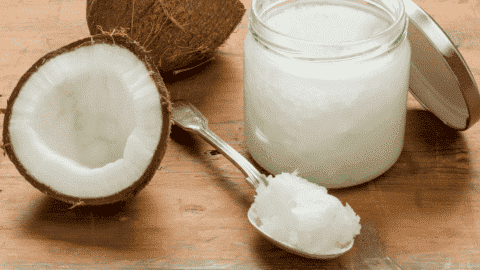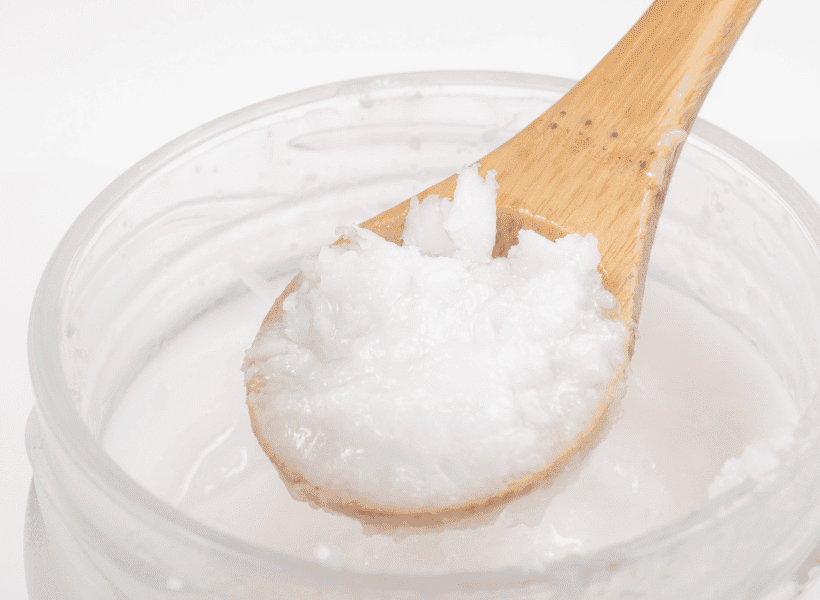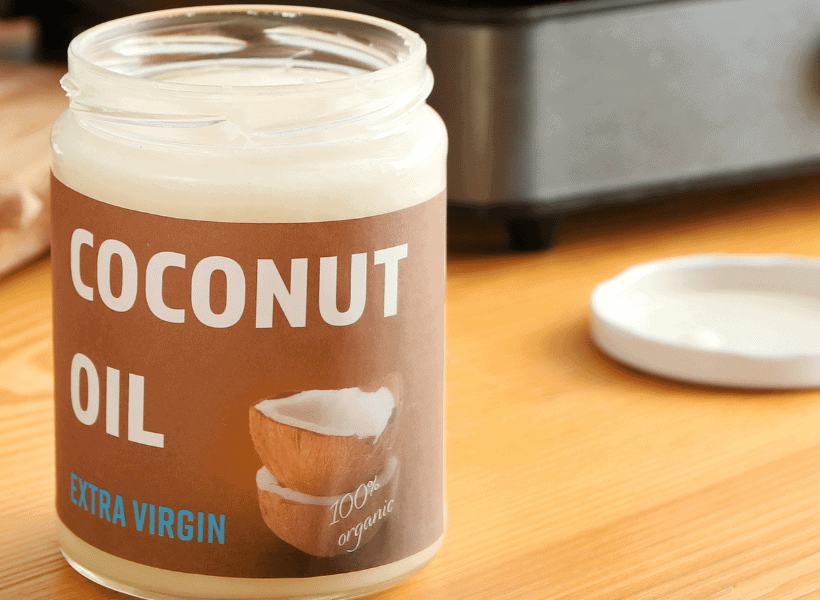How long does coconut oil last and how can you tell when it has gone bad? You may have those questions and more about this versatile and super popular oil. Not only is coconut oil a healthy oil to use in preparing many delicious recipes, but coconut oil also has many other uses from home remedies to beauty care. So, let’s take a closer look at ways you can extend the shelf life of your jar of coconut oil and different ways to use it.

What is Coconut Oil?
Coconut oil is made from extracting the oil from fresh coconut meat and coconut milk from the coconut palm fruit. In solid form the oil is white in appearance with a melting point of 78 °F degrees. Once melted, the liquid form is transparent that has a very slight hint of yellow or golden color.
Because it can withstand cooking on high temperatures is perfect for recipes like this Coconut Fish Curry and these scrumptious Coconut Pancakes. In liquid form, it’s also great added to your favorite smoothie recipes. Though it has grown in popularity in the world of cooking oils, it’s also widely used in many beauty products and some household products.
How Long Does Coconut Oil Last?
The long shelf life of coconut oil is one of the things that makes buying better grades or organic coconut oil worth it. How long it last mostly depends on the different types of coconut oil, the quality of the oil and how it has been stored. The two primary types are refined coconut oil and extra virgin coconut oil.
Refined Coconut oil is a type of coconut oil that’s made by extracting oil from coconuts that have been baked before the oil is extracted, a process known as dry milling. Sometimes chemicals are used in extracting the oil through this process. This type of oil has a shorter shelf life of about a year to a year and a half.
Unrefined coconut oil is made by wet milling. That means the oil is extracted from fresh coconuts without using bleach or other chemicals. It’s also known as pure or virgin coconut oil and is the least processed of the type of oils available. Most virgin and extra virgin coconut oils can last anywhere between three to five years when stored properly.
What’s the Best Way to Store Coconut Oil?
Though you usually store coconut oil at room temperature, to help coconut oil have a longer shelf life, you should store it in an airtight container in a cool place and preferrable a dry place like a pantry or kitchen cabinet that is away from direct sunlight of changes in temperature. For instance, you don’t want to keep a jar of coconut oil in a cabinet that’s next to your oven or in a bathroom cabinet where humidity and temperatures will vary. Coconut oil can also be kept in the fridge if you prefer.
Can You Freeze Coconut Oil?

You sure can and it freezes well for a really long time! Keep in mind, once you have thawed it out, it should not be refrozen. That’s why it’s recommended you freeze coconut oil is individual size portions. Here’s how you do it:
- Before you freeze coconut oil, you need to melt it. You don’t want to cook it, just heat it up to liquify it.
- Using a clean spoon or kitchen funnel, to pour into smaller portions in a freezer-safe container.
- Cover each container well with plastic wrap.
- Gently place the containers in the freezer until they are frozen solid.
- Remove the frozen oil and place them in a freezer bag and squeeze out all the excess air.
- Date the bag and stick it bag in the freezer for up to two years.
How to Tell if Coconut Oil is Bad
The first step to gauging if your coconut oil is still good is to look at the expiration date on the outside of the jar. But even if it’s within the “best-by date,” if it has been subjected to different temps and not kept in a dark place, you will need to check for other signs of spoilage. There are several ways you can check to see if it’s still good. Rancid coconut oil or expired coconut oil will usually have these traits:
- The creamy white solid oil will have a yellowish color.
- Fresh coconut oil will have a slight hint of coconut smell but more of a neutral scent. Bad coconut oil will have a sour smell or less than fresh odor.
- You can definitely tell you have bad coconut oil by tasting it. Spoiled coconut oil has a bitter or sour taste.
- The smooth consistency turns into having a chunkier texture that looks like curdled cream.
If Coconut Oil Healthy?
Half of virgin coconut oil’s saturated fat is lauric acid, a medium-chain triglyceride (MCT) that’s associated with a numerous health benefit. Incorporating coconut in your diet is better for you than some other oil, like canola.
Canola oil has inflammatory properties and like most vegetable oil, they come from GMO’s that are sprayed chemical other toxic solvents to extract them, so that definitely makes coconut oil a better choice.
Having that said, fat of any kind should be eaten in moderation. If you would like to read more about the pros and cons of coconut oil, take a look on this article on Healthline.

14-Day Intermittent Fasting Meal Plan: 1500 Calories
This is the best meal plan for intermittent fasting! Everything is planned for you – macros, calories, meals, shopping lists…all you have to do is grab the groceries. Don’t waste any more time, get this time saver and start losing weight now!
What is MCT Oil?
If you’re familiar with the Keto diet or other low carb diets, chances are you’ve heard of people adding MCT oil to their coffee or smoothies in order to boost energy and burn fat. But some people are unaware of what MCT actually is. MCT oil is a dietary supplement that’s distilled from coconut oil. It’s not just liquid coconut oil like some would assume.
Consumption of this oil has reportedly shown to be helpful with the promotion of hormones that help you feel full, which could result in aiding with weight loss. Cleveland Clinic has an interesting article that details more benefits of MCT, like increased energy, better memory and heart health. Read more about this here.
Ways to Use Coconut Oil

Cooking with Coconut Oil
- Because coconut oil has a fairly neutral taste and like olive oil, it has a high smoke point that’s great for pan searing foods or sautéing foods over high heat.
- One of the simplest vinaigrettes or salad dressing you can make for salads is to heat up some coconut oil, add some apple cider vinegar and some fresh lemon juice. Add your favorite herbs or spices and you have a very tasty homemade dressing ready in minutes.
- Coconut oil or MCT oil can be used as a marinade for grilled steak, chicken and veggies.
Home Remedies
There are so many wonderful ways you can use coconut oil around the house. Here are some of the most popular:
- Give your stainless steel a shine with a little melted coconut oil.
- Condition wooden cutting boards and wooden kitchen utensils with it.
- Prevent your Tupperware from staining by coating the inside of the container with a little coconut oil on a paper towel before putting leftover in them.
- Use it to remove labels and sticky residue from jars or glass containers
- You can use a touch of solid coconut oil or even some you’ve melted and keep it in a glass jar for fixing squeaky hinges. Make sure if you are reheating it over and over, that you designate that glass bottle for household purposes only due to food safety purposes.
- It can remove scuff marks from the wooden or laminate floors.
Beauty Benefits
Here are some great ways to use coconut in your regular beauty regime:
- In solid state, it works as awesome lip balm in cold or windy weather.
- Use a drop or two of melted coconut oil to help defrizz your hair or you can make a hair mask from it.
- Sooth itchy insect bites.
- Use it to clean your makeup brushes.
- Mix a little melted coconut oil with your favorite bath salts to create a wonder exfoliant.
- Coconut oil makes a great makeup remover.
I hope you have found this article helpful in determining coconut oil’s shelf life as well as some other useful information.



